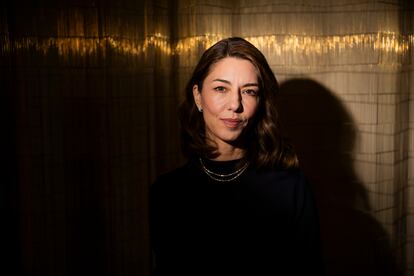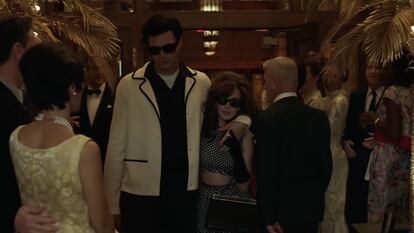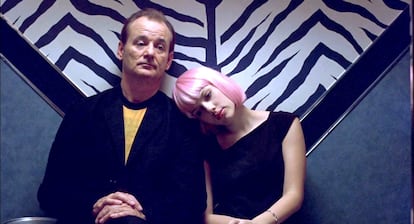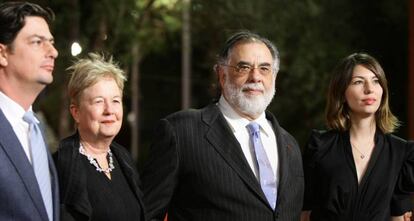Sofia Coppola: ‘I never wanted Elvis to be a villain’
The youngest filmmaker to ever win an Oscar for Best Director captures the life of Elvis Presley’s wife in ‘Priscilla’ and recounts her family’s lessons — and her own struggle for independence

There are those who dream all their lives of becoming part of the world of movies. Sofia Coppola, in contrast, was born being part of the seventh art. She made her debut in front of the camera prior to turning 10 months old: before she spoke or walked, she learned to act. Granted, it was an easy role: she only had to let them splash water onto her. She was playing Michael Francis Rizzi, the baby who is baptized towards the end of The Godfather. Coppola once said her first memory was of “the jungles of the Philippines during the filming of Apocalypse Now.” Also, that she used to visit the home of Akira Kurosawa in her childhood. When she was three years old, during The Godfather Part II, she played a little girl onboard a boat. When she came of age, in the third part of the trilogy, she played Mary Corleone. She’s always said that the best lesson taught to her by her father Francis Ford and her mother Eleanor, both of them directors, was that of “a life of creativity”. Although, in her intensive course, she soon discovered the dark side of that dream: in a recent interview, she still remembered the magazine cover that featured her young face and the words “Did she ruin The Godfather?”
An 18-year-old girl under the spotlight. Criticized. Intimidated by a powerful, masculine world. When Coppola read Elvis and Me, Priscilla Beaulieu’s 1985 biography, it seemed familiar. It was supposed to be an easy summer read. It became her new movie. “It’s a story about a strong woman and her finding her autonomy,” says the filmmaker (New York, 51 years old) to a group of international journalists at last year’s Venice Film Festival, where Priscilla premiered.
It could be that the struggle for independence is another link that connects the two women. Coppola turned to the project after Apple declined to finance her series adaptation of Edith Wharton’s novel The Custom of the Country. But first, she sent a public message to the company: “The idea of an unlikable woman wasn’t their thing.” Similarly, she did not hesitate to correct her father when he visited his daughter’s first shoot in 1999 for The Virgin Suicides — another book, by the way, that she fell in love with, so hard she had to make it into a movie. The legend told her: “You should say ‘action’ louder, more from your diaphragm.” She told The New York Times that in that moment, she thought, “OK, you can go now.”

Perhaps now, the tables have turned, and Francis is more likely to be asked about Sofia than the other way around. She is, after all, the youngest filmmaker — and the first American woman — to win the Oscar for Best Director (for 2003′s Lost in Translation). An artist fascinated by photography and fashion magazines, she is unafraid to say that it is possible to “be substantial and still be interested in silly things.” An icon who inspires the imagination of teenagers and who signs autographs for girls who are named Sofia, after her. A creator who proved capable of building, from Marie Antoinette to The Beguiled to Somewhere, her own personal universe. Coppola has always wanted to remain outside the “mainstream”, she emphasizes, and that desire returned in Priscilla. With it, the mission to lift up another woman who was hidden underneath the shadow of a legend.
“Everything is in the book. I didn’t invent anything, and I wanted the story to really be through her point of view, to be seen through her eyes,” says Coppola in Venice. That is to say, the eyes of a woman who was 14 years old when a 24-year-old singer and soldier, already the subject of certain fame and owner of irresistible attraction, began to take an interest in her. There are almost no movies or concerts in Priscilla. Partially, because the foundation that manages Elvis’s copyrights forbade the use of his songs. It’s another sign of Coppola’s unique technique. Her film is more about the telling of the story of a human being who lived, rejoiced and suffered alongside the icon, for over 15 years. It’s a tale halfway between idyll and terror. Even if Beaulieu, who was also at the Venice Film Festival, reiterated that Elvis was the love of her life.
The legend himself, when seen here through the eyes of his wife, becomes a mere man. At times, Elvis is egomaniacal, insecure, manic, even pathetic. “The film doesn’t keep him on a pedestal. I thought it was interesting to learn that he was so frustrated, that he wanted to be a serious actor. I could empathize with that struggle. I tried to approach it with sensitivity and not be judgmental. I never wanted him to be a villain.” But, Coppola says, “It’s all her story.”

Coppola described the unprecedented feeling for her of the subject of her film being alive, present and just a phone call away. “One of the biggest challenges was balancing between being respectful to her, wanting her to like it and feel like it was representing her and making my expression of how I want to make a film,” Coppola explained. “I’m touched by stories where people are trying to figure out who they are.”
Not being able to use Elvis’s songs hardly mattered to Coppola: she thinks it ended up being good for the film. Besides, when she was young, she was more into listening to another Elvis, Costello. Nor was she bothered by the fact that, at almost the same moment, Baz Luhrmann was shooting and putting out an Elvis biopic. On the contrary, she believes that the renewed interest in the singer could benefit her film. But Coppola’s film had a quarter of the budget of Luhrmann’s blockbuster. And shortly before filming began, they lost a million dollars from their total. Hence, she was forced to fit the entire shoot into a single month. “It’s one the hardest things I’ve ever done,” said the director. For her part, Beaulieu said that Coppola had done “a fantastic job”.
In Venice, the film’s lead actress, Cailee Spaeny, won the Volpi Cup for Best Actress. The honor acknowledged Coppola’s meticulous casting, assisted by Kirsten Dunst, her ongoing collaborator. The height difference between the diminutive Spaeny and the towering Jacob Elordi, Coppola’s Elvis, served as additional metaphor. So too did the noise and chaos in the musician’s sequences, as opposed to the sometimes-claustrophobic intimacy in which the young woman is often left alone. Of course, Coppola deployed her trademark, inch-by-inch attention to mise-en-scène, from the melancholy color palette used to portray Priscilla’s time in Germany, versus the explosion of colors that heralds her visit to her beau in America, to the moment when she pulls a toothbrush out of her suitcase. “I love all the little details, because to me, that makes it real. That part I enjoy, because it’s a little bit of a puzzle. How do you show visually without narration?”

“[Making a movie] takes so many years and so much of your energy that you have to really love it. The only thing I’m cautious about is not doing anything that I can’t work with my heart totally,” says Coppola. At this point, the filmmaker says she’s not thinking about the public, but instead looks to film what she likes. She realized that Priscilla spoke to her for another reason. “I still see women in relationships where they let the men make all the decisions, even now. It was interesting for me to be looking at my mother’s generation, but also having daughters, who look at parts of the story and say, ‘I would never let a man tell me what to do.’”
Coppola doesn’t want to tell Romy and Cosima — both of them from her relationship with musician Thomas Mars — what to do, either. The former, a 17 year old, went viral a few months ago with a video on the social network TikTok. Will they follow in their cinematic family’s footsteps? Only time will tell. For the moment, the saga continues, thanks to the clan’s patriarch. Grandpa Francis Ford is finally working on his eagerly awaited film Megalopolis, of which he has been dreaming for four decades. At 84 years old, he’s ready to hoist a camera once again, as he has for so many previous masterpieces. None of them equal the home video he shot on March 14, 1971, however. Eleanor went into labor; Francis Ford hit the ‘record’ button; Sofia came into the world. And into the world of movies.
Sign up for our weekly newsletter to get more English-language news coverage from EL PAÍS USA Edition
Tu suscripción se está usando en otro dispositivo
¿Quieres añadir otro usuario a tu suscripción?
Si continúas leyendo en este dispositivo, no se podrá leer en el otro.
FlechaTu suscripción se está usando en otro dispositivo y solo puedes acceder a EL PAÍS desde un dispositivo a la vez.
Si quieres compartir tu cuenta, cambia tu suscripción a la modalidad Premium, así podrás añadir otro usuario. Cada uno accederá con su propia cuenta de email, lo que os permitirá personalizar vuestra experiencia en EL PAÍS.
¿Tienes una suscripción de empresa? Accede aquí para contratar más cuentas.
En el caso de no saber quién está usando tu cuenta, te recomendamos cambiar tu contraseña aquí.
Si decides continuar compartiendo tu cuenta, este mensaje se mostrará en tu dispositivo y en el de la otra persona que está usando tu cuenta de forma indefinida, afectando a tu experiencia de lectura. Puedes consultar aquí los términos y condiciones de la suscripción digital.









































